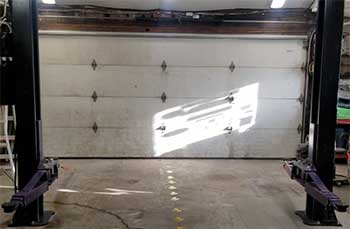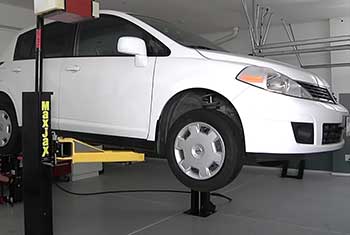Anyone familiar with automotive repair understands the importance of a reliable car lift. Two of the market leaders in this space are Triumph and MaxJax.
Let’s compare the Triumph C7000 and the MaxJax car lift, detailing their features, pros and cons, and helping you make an informed choice.
A Brief Comparison Table
| Feature | Triumph C7000 | MaxJax Car Lift |
|---|---|---|
| Design | Two-Post Lift | Two-Post Portable Lift |
| Space Requirement | Requires More Space | Requires Less Space (Ideal for Smaller Garages) |
| Weight Capacity | 7,000 lbs | 6,000 lbs |
| Safety Features | Dual ‘Direct-Drive’ system, Automatic Arm Restraints | Dual-Hydraulic Direct-Drive, Automatic Safety Locks |
| Installation | Straightforward Installation | Slightly More Complex Due to Portability |
| Ideal For | Larger Garages, Heavier Vehicles | Smaller Spaces, Range of Vehicles |
Triumph C7000 Car Lift: The Pros
Let’s start by diving into the Triumph C7000 car lift. It’s a two-post lift system with a 7,000-pound capacity, hence the name ‘C7000’. What stands out about this model?
- Performance and Capacity

The Triumph C7000’s foremost strength lies in its sturdy construction and excellent load capacity.
The 7,000-pound capacity covers a wide variety of vehicles, from small compact cars to larger SUVs and trucks.
- Safety Features
Triumph C7000 doesn’t skimp on safety. It features a dual ‘Direct-Drive’ system, reducing the chances of any failure.
In addition, an automatic arm restraints feature ensures the arms stay in their position once the lift is raised.
- Easy Installation
The Triumph C7000 comes with a detailed installation guide, making the setup process straightforward. Users have applauded its ease of installation, an advantage for those new to the world of car lifts.
Triumph C7000 Car Lift: The Cons
Despite the C7000’s strengths, it has a few shortcomings.
- Space Requirements
The C7000, due to its two-post design, requires more garage space compared to a portable or a scissor lift. This can be a drawback for smaller workshops or home garages.
- Weight Limit
While a 7,000-pound capacity is significant, it may not be enough for heavier vehicles like larger pickup trucks or RVs.
MaxJax Car Lift: The Pros
Now, let’s pivot to the MaxJax car lift. This lift is revered for its unique, portable design, and myriad of features.
- Portability and Space Efficiency

One of the MaxJax’s shining features is its portability. Unlike the Triumph C7000, the MaxJax car lift is designed to be easily moved and stored.
This is a boon for small garages and workshops, where space is at a premium.
- Safety and Stability
MaxJax includes safety as a core feature.
The lift features a dual-hydraulic direct-drive design for better stability, and the automatic safety locks ensure the lift stays in place when elevated.
- Versatility
MaxJax’s portability does not compromise its versatility. The car lift has adjustable lift arms and can be used for a broad range of vehicles, from compact cars to larger trucks.
MaxJax Car Lift: The Cons
The MaxJax car lift, like any product, has its drawbacks.
- Lower Weight Capacity
The MaxJax lift has a weight capacity of 6,000 pounds, a thousand pounds less than the Triumph C7000. This might limit its utility for heavier vehicles.
- Installation
While not overly complex, installing the MaxJax can be slightly more challenging than the Triumph C7000 due to its portable design.
Key Differences Between Triumph C7000 and MaxJax Car Lift
While the Triumph C7000 and MaxJax car lift share the primary function of lifting vehicles for repairs or maintenance, they’re designed with distinct features catering to different user needs. Here, we will delve deeper into their key differences.
- Design and Space Requirements
The Triumph C7000 is a two-post car lift, a design that inherently requires more space in your workshop or garage. It needs a broader base to maintain stability. If you have ample space, this isn’t an issue.
However, for those with space constraints, this design might be limiting.
On the contrary, the MaxJax car lift is designed with portability in mind. It’s a two-post portable lift that can be moved or stored easily, making it an ideal choice for those working within smaller spaces.
- Weight Capacity
Weight capacity is another defining difference between these two models. The Triumph C7000, as the name implies, can handle vehicles up to 7,000 pounds.
This capacity covers a wide range of vehicles, including small compact cars and larger SUVs or trucks.
In contrast, the MaxJax lift has a weight capacity of 6,000 pounds. While this is still substantial and will cater to many vehicles, it’s a thousand pounds less than the Triumph C7000. If you routinely work on larger, heavier vehicles, this is a factor to consider.
- Installation
The Triumph C7000 is widely praised for its straightforward installation. It comes with a comprehensive guide, making the setup process relatively easy even for those new to car lifts.
The installation process for the MaxJax car lift, however, can be slightly more complex due to its portable design. While not exceedingly challenging, it might take a bit more time and patience compared to the C7000.
While both car lifts have their unique advantages and disadvantages, the right choice depends on your specific requirements, including the space available, types of vehicles you typically work on, and your preferences for installation and portability.
Also Read: Comparison of EZCarLift And QuickJack Car Lifts.
The Verdict
So, between the Triumph C7000 and the MaxJax car lift, which is the superior choice? It boils down to your specific needs.
The Triumph C7000 offers a greater weight capacity and a high level of stability. It’s an excellent option for professionals or hobbyists with larger garages who routinely work on heavy vehicles.
On the other hand, the MaxJax car lift shines with its portability and versatility, a perfect fit for small spaces or those who value the ability to move and store their lift easily.
In the end, both the Triumph C7000 and the MaxJax car lift offer commendable features and performance. The key is understanding your specific needs and choosing the one that aligns best with those requirements.
Happy lifting!

